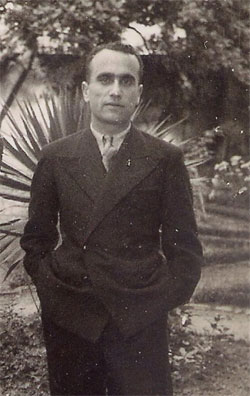First theater play about the Lebanese emigres’: “Al Muhajer”
Dr. Walid Phares/ November 08/15
The first theater play (masrahiya) performed in Lebanon after 1943, and possibly the first ever, addressing the Lebanese emigres’ was titled “Al Muhajer” (The emigrant). It was written by my father Attorney Halim Phares to honor the majority of Lebanese living in dozens of countries around the world.
Father’s admiration of the Lebanese Diaspora had roots in historical events he witnessed as a child. As World War One started when he was 5, he witnessed the Ottoman blockade of Mount Lebanon and saw death by famine and desolation across the Petit Liban. He was sent with our grandmother to Chekka where she worked at a bakery during the war. Upon his return to Ghouma (Batroun), our ancestral village he realized that some families had died of famine while many others had left.
He was told they “emigrated” (haajaru). Since then the vision of tens of thousands who had to emigrate their motherland to survive, leaving behind them loved ones and dismembered families, impacted him. He lived the saga of the “Muhajirin” emigres, exactly a hundred years ago. He developed an emotional and intellectual interest in their fate, future and linkages to Lebanon and imagined sceneries of reunions taking place in Lebanon after their return. Halim believed in a return of the emigres’, one day.
During his studies at Saint Joseph University, and a as a young lawyer, he often wrote poetry about and translated literature by emigrants, including Gebran. As France was leaving Lebanon after WWII, the young lawyer freshly married, decided to remind the public about those millions of emigres’ and their descendants across the world. He was concerned that those who left were not given their nationality.
Thus he wrote what was the first play centered on the leaving, life and return of emigrants, mainly from and back to their villages. The play was directed by Saad el Dine Sami Ramadan, and opened on June 24, 1948 at the Theater of the Cercle de la Jeunesse Catholique (CJC) and offered to the “valor of Lebanese soldiers” under the sponsorship of the Minister of Defense, Mir Majid Erslan.
It was attended by the “tout Beyrouth” (all Beirut) and among the attendance previous and future Presidents, Ministers and deputies, many among whom where Halim’s students.
Father’s admiration of emigres’ was transmitted to me over the years as he recounted stories and tales about those who left and who became a world of its own. Ironically but not strangely I developed an interest in the emigres’ communities via my lectures, travel and later on via my public service in the mother land and internationally at the service of this nation dispersed across the globe. I was perhaps continuing the work of my father.
Hopefully one day, we will be able to celebrate this play and the work of Maitre Halim Phares on behalf of Lebanon’s emigres’.


















